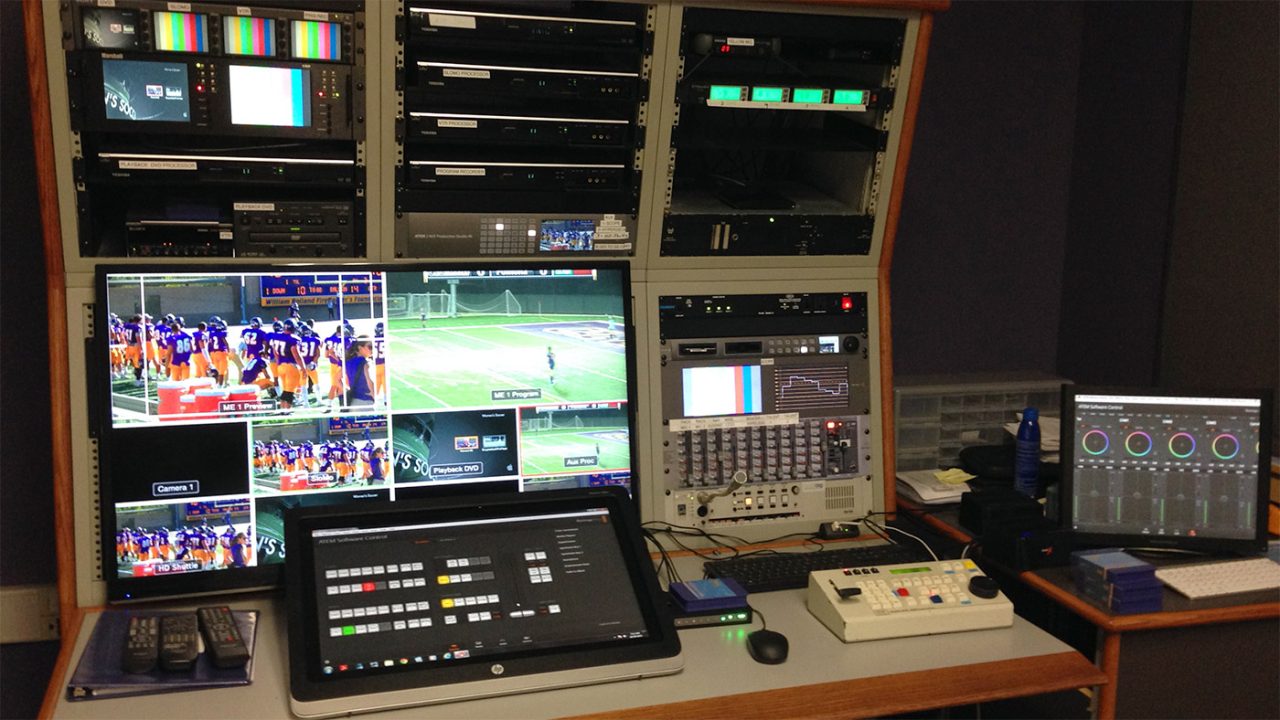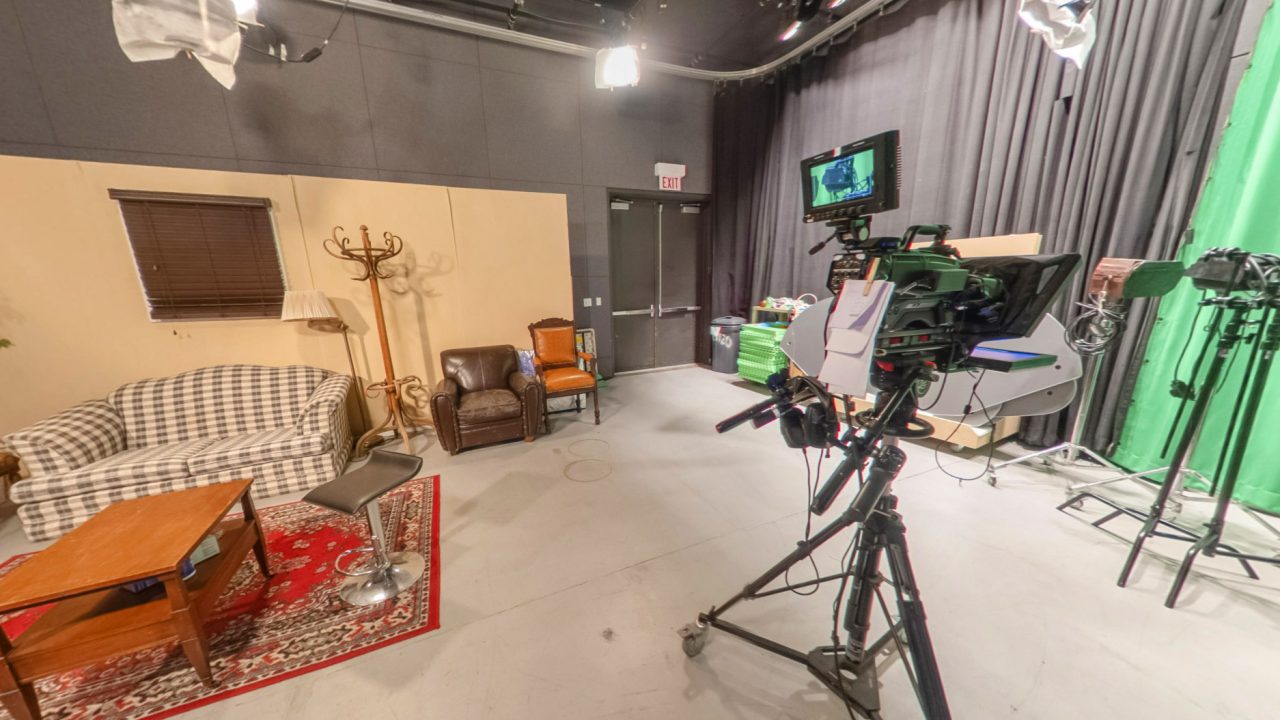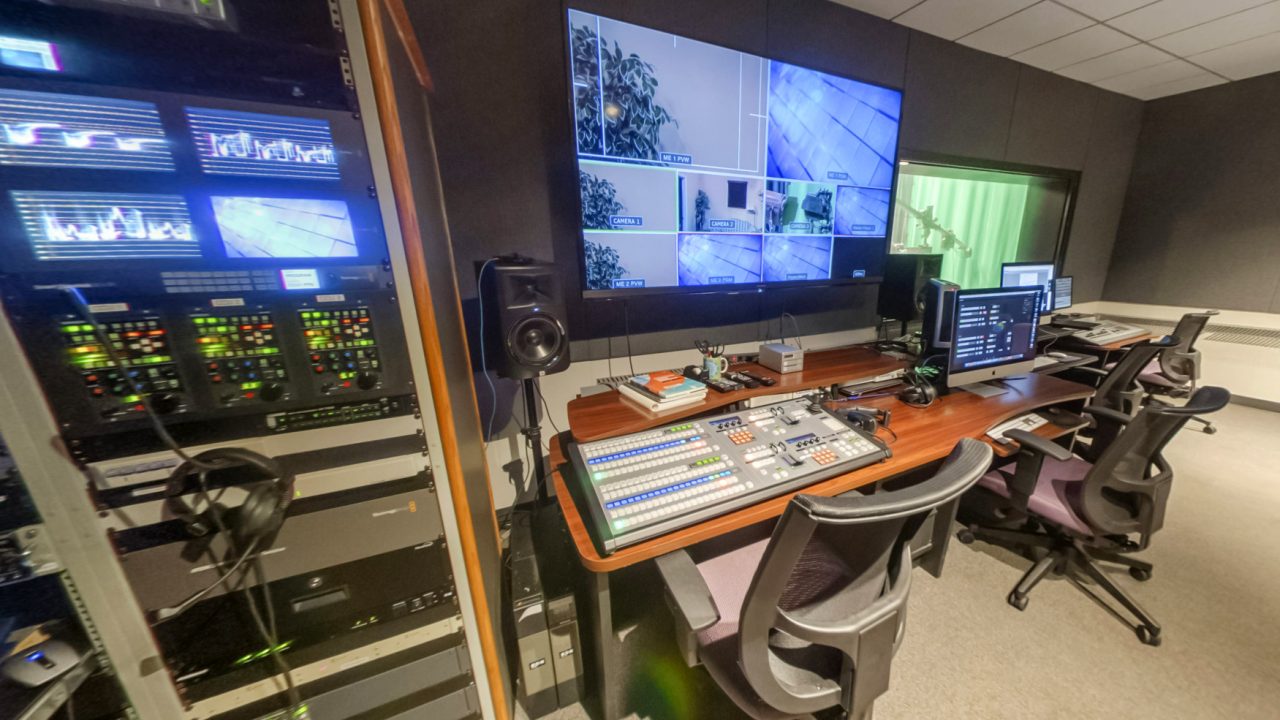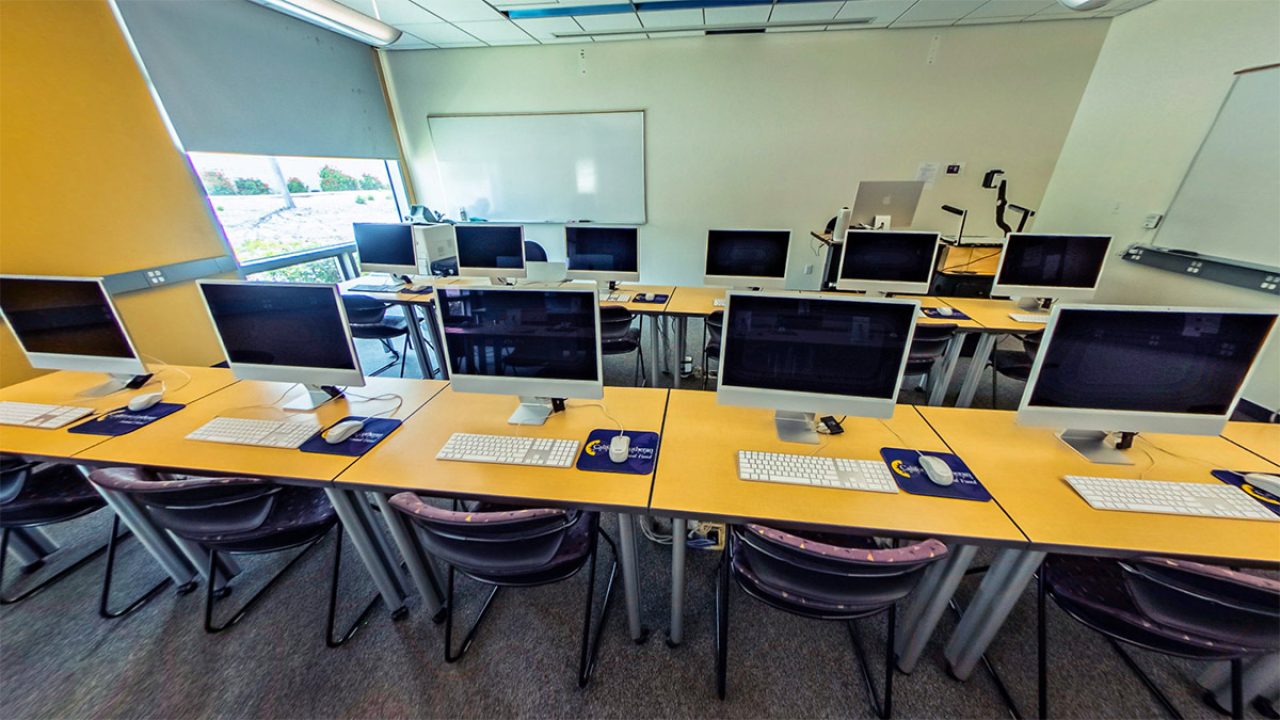Film and Television
Bring your stories to the screen.
A high demand for video content has opened up new career opportunities in streaming, digital, and social media. According to the U.S. Department of Labor, this is an industry with higher than average job growth and median salaries.
Gain real-life skills for the entertainment industry
When you tell stories through film and television, you can shape opinions, warm hearts, document injustice, capture important moments in history, and celebrate the human experience.
Our curriculum will give you hands-on training in Cal Lutheran’s television studio and on-location from faculty who have industry experience. You’ll use equipment with the same high-quality production value as used by those in the industry.
Build your network — right next to Hollywood
Cal Lutheran’s proximity to Hollywood will provide you with year-round access to apply what you learn in the classroom by pursuing internships, participating in film festivals, attending industry conferences, and making connections for jobs.
Customize your studies to your creative interests
As a film and television major, you’ll learn the fundamentals of modern media production, and you’ll have the opportunity choose the elective courses that interest you most — covering subjects such as: television/cinema production, screenwriting, storyboarding, animation, motion graphics, and sound for film.
At a Glance

Degree Type
Bachelor of Arts
Department
Film and Television Department
School/College
College of Arts and Sciences
Next Steps
Interested in this major? Here's what you can do next:
Being able to go from theorizing film to creating it is a really good way to get hands-on experience, and it’s super fun. Every day is jam-packed with endless opportunities.
Katie Romanovich
With challenging and relevant courses, outstanding faculty, small class sizes, and an emphasis on hands-on learning, the film and television program will position you to succeed in your chosen career.
Degree requirements
Find out what it takes to earn a degree in film and television and explore the courses.
Emphasis Areas
Customize this major to your interests by taking courses in an area of focus:
Film Studies
Learn how to study film as an art form and a mass medium. The curriculum focuses on the critical, historical, and theoretical aspects of motion pictures.
Production
Build advanced skills in film and television production, including camera operations, editing, lighting, writing, directing, and producing from experienced faculty.
Highlighted Courses
Get familiar with some of the courses you might take in this major.
FILM 304: Lighting and Cinematography for Film and TV
Intermediate hands-on training in lighting and cinematography for narrative films, television programs, and other media productions. Students will learn how to communicate content and convey emotion through light, exposure, angle, focus, and composition.
Read descriptionFILM 305: Sound Design for Film and TV
Beginning training in audio mixing, processing, and sound design for narrative films, television programs, and other types of media projects. Introduction to industry standard audio software and sound techniques and practices such as Foley and ADR.
Read descriptionFILM 306: Screenwriting
An introductory course on the craft of writing for television or film. Emphasis is on narrative storytelling for the screen, understanding film grammar and the tools of the screenwriter from basic three-act structure to characterization. In a workshop approach, students will develop their own story premise, treatment, outline and draft script, plus revisions.
Read descriptionFILM 307: Advanced TV Production
Produce a bi-monthly soap/sitcom for web distribution in short formats (5 - 8 minutes). Students will write the scripts and then participate in the pre-production, production and post production. Class members will design and build the sets, act, direct, work as crew and as editors on this bi-monthly web series.
Read descriptionFILM 308: Advanced Cinema Production
Students will write, produce, direct and edit a 10-20 minute short narrative or documentary film with the purpose of submitting it to student film festivals across the country. Students will attend advanced workshops in editing and lighting.
Read descriptionFILM 310: Producing and Directing For Film and TV
Students study the art and practice of producing and directing for film, including production coordination and supervision, working with actors, fundraising, managing crews and locations, and addressing legal issues. Students receive hands-on instruction via labs and work on student film productions.
Read descriptionView all courses in Film and Television
Recommended Minors
Want to add even more value to your degree? Consider one of these minors to gain a unique combination of skills and perspectives.
Check out the spaces and tools you'll have access to in this major. Explore the entire Cal Lutheran campus with our virtual tour
We offer hands-on opportunities that give you the freedom to explore your passion through real-world work and prepare for a fulfilling career.
-
High-Quality Facilities and Equipment
Your classes will provide hands-on training in Cal Lutheran’s television studio and on-location from faculty who have industry experience.
You’ll also have access to equipment with the same high-quality production value as used by those in the industry.
-
Internships
Cal Lutheran’s proximity to Hollywood means you’ll have year-round access to internships to gain experience and make connections.
Employers include:
- ABC
- Bravo
- Bunim-Murray Productions
- CBS
- Creative Artists Agency
- Disney
- Fox Sports
- NBC
- Netflix
- NFL Network
-
Special Events and Speakers
Your classes will have guest visits from professional writers, producers, and production experts working in the industry.
You’ll also be able to attend numerous film summits and other special events throughout the year to get broad perspectives on film and television.

I work in both post and field production following and helping define episode story lines. When I am field producing I conduct interviews with the cast, produce scenes, and create story documents that are sent to the network. When I am working in post production, I work with editing technologies to prepare the footage for an editor. I make sure the best footage and moments are used in order to create a television series.
Alexandra Butler
Freelance Story Producer
Streaming services like Netflix and Amazon Studios have increased demand for original content. According to the U.S. Bureau of Labor Statistics, film/video editors, producers and directors have forecasted higher than average growth over the next decade, with higher than average median salaries. Other industries also require video content for use in marketing, advertising, public relations, and corporate training and education programs.
Potential Careers
Producers and Directors
Produce or direct stage, television, radio, video, or film productions for entertainment, information, or instruction. Responsible for creative decisions, such as interpretation of script, choice of actors or guests, set design, sound, special effects, and choreography.
Read descriptionMedia Programming Directors
Direct and coordinate activities of personnel engaged in preparation of radio or television station program schedules and programs, such as sports or news.
Read descriptionTalent Directors
Audition and interview performers to select most appropriate talent for parts in stage, television, radio, or motion picture productions.
Read descriptionMedia Technical Directors/Managers
Coordinate activities of technical departments, such as taping, editing, engineering, and maintenance, to produce radio or television programs.
Read descriptionNews Analysts, Reporters, and Journalists
Narrate or write news stories, reviews, or commentary for print, broadcast, or other communications media such as newspapers, magazines, radio, or television. May collect and analyze information through interview, investigation, or observation.
Read descriptionAudio and Video Technicians
Set up, maintain, and dismantle audio and video equipment, such as microphones, sound speakers, connecting wires and cables, sound and mixing boards, video cameras, video monitors and servers, and related electronic equipment for live or recorded events, such as concerts, meetings, conventions, presentations, podcasts, news conferences, and sporting events.
Read descriptionLighting Technicians
Set up, maintain, and dismantle light fixtures, lighting control devices, and the associated lighting electrical and rigging equipment used for photography, television, film, video, and live productions. May focus or operate light fixtures, or attach color filters or other lighting accessories.
Read descriptionFilm and Video Editors
Edit moving images on film, video, or other media. May work with a producer or director to organize images for final production. May edit or synchronize soundtracks with images.
Read descriptionEmployers
Some of the organizations our graduates work for include:
- ABC
- Bravo
- Bunim-Murray Productions
- CBS
- Central Casting
- Creative Artists Agency
- Disney
- ESPN
- Fox Sports
- KTLA
- NBC
- Netflix
- NFL Network
- STARZ
- TwoFour Media

I worked at Media Services for about two years, where I developed event coordination skills, such as good communication and time management, to make sure that things were getting done in a timely and effective manner. In my current role, I communicate a lot across different departments and have a lot of things that need to get done in certain time frames, so those are essential skills to have. I also took a bunch of film classes that helped me learn all that I did!
Amy Duverge '23
Media Management Coordinator , Disney Entertainment Television
This page includes information from O*NET OnLine by the U.S. Department of Labor, Employment and Training Administration (USDOL/ETA). Used under the CC BY 4.0 license. Some occupations listed above may require a related graduate degree.
How We Prepare You for Success
We have 20,000+ employer contacts for jobs and internships, with over 200 listings posted each week.
Our excellent career counselors in the Career Services center will get in touch with you during your very first term on campus. They offer over 50 workshops each year on resume writing, interviewing, salary negotiations, applying to graduate schools, and other critical skills to help you begin your career successfully.
After you graduate from Cal Lutheran, you receive free access to Career Services for life, as a valued member of our alumni family.
of Cal Lutheran graduates find a job or enroll in graduate school within nine months
We work with students and families to make sure everyone who is admitted to Cal Lutheran can afford it.
Tuition & Fees
You and your family might have questions about how you’ll cover the costs of college. We can tell you this — it costs less than you think.
Scholarships & Grants
We offer a range of awards based on academic merit and financial need. This is money that does not need to be repaid.
Net Price Calculator
Take a few minutes to use our calculator and get yourself a personalized estimate of your costs and financial aid.
Let us know and we'll send you information about our academics, campus life, the admission process, and more!
Ready to apply?
We’re now accepting applications for Fall 2026!
Level Up Your College Search
Check out our college success guides to help you navigate the search process.

How to Choose a College Major
Your major will be a significant part of your academic experience. How do you pick the right one?

5 Tips for Applying to College
Learn how to look good when applying to colleges, with personal tips to stand out from Cal Lutheran admission counselors.

How to Afford College
Read this guide to minimize costs as you save for college during high school — learn all about scholarships, financial aid, FAFSA, and more!

5 Key Advantages of a Liberal Arts Education
Are the liberal arts still worth studying in today's world? If you want a future-proof college education — absolutely.

How to Get Recruited for College Athletics
Check out our tips to connect with coaches, navigate campus visits, and move forward with confidence.

Private vs. Public Universities
The differences between each — and how to choose the school with your dream college experience.




